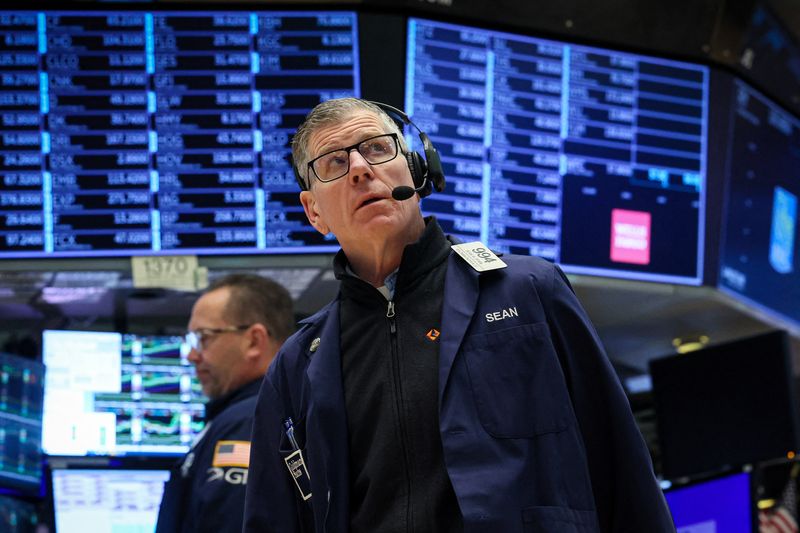Oracle stock falls after report reveals thin margins in AI cloud business
Investing.com-- The S&P 500 closed lower Thursday after the White House clarified that tariffs on China would now total 145%, escalating concerns about an economically-damaging U.S.-China trade war.
At 4:00 p.m. ET (21:00 GMT), the Dow Jones Industrial Average dropped 1015 points, or 2.5%, the S&P 500 index fell 3.5% and the NASDAQ Composite declined 4.3%.
China tariffs at 145%, White House Says
The White House confirmed Thursday that tariffs imposed on Chinese imports now stands at 145%. The update comes a day after Trump announced on Truth Social that China was facing 125% "reciprocal" levies for retaliatory against the U.S. tariffs.
The higher tariffs on China soured sentiment on stocks a day after Trump announced that he reciprocal levies would drop on to 10% for countries that hadn't retaliated against the Apr. 2 "Liberation Day" tariffs.
China had hiked tariffs on U.S. imports to 84%, from 34% on Wednesday, in retaliation to Trump's first increase of U.S. tariffs, and these duties came into effect earlier Thursday.
China’s commerce ministry said on Thursday that China is open to dialogue with the U.S. but this must be on the basis of mutual respect and equality.
Pressure, threats and blackmail are not the right way to deal with China, ministry spokesperson He Yongqian told a regular press briefing when asked about whether the world’s two largest economies have started tariff negotiations.
China will "follow through to the end" if the U.S. insists on its own way, he said.
Investors worried that the trade spat between the two largest economies in the world could easily result in a global recession.
Goldman Sachs has cut its growth forecasts for China, now expecting the Asian giant’s real GDP to grow 4.0% in 2025 and 3.5% in 2026, down from its previous forecasts of 4.5% and 4.0%, respectively.
March CPI weaker than expected
Data released earlier Thursday showed that U.S. consumer prices increased by less than anticipated in March on an annualized basis, and actually declined month-on-month.
The consumer price index rose by 2.4% in the twelve months through March, after moving up by 2.8% in February. On a monthly basis, the figure decreased by 0.1%, compared to a previous uptick of 0.2%.
Economists had expected readings of +2.5% year-on-year and +0.1% month-on-month.
While these figures would point to weakening inflationary pressures, and thus less need for the Federal Reserve to cut interest rates again, analysts have been at pains to point out that they cover a period before the implementation -- and eventual delay -- of President Donald Trump’s sweeping tariffs.
Tech claws back some gains from a day earlier
Tech reversed some its gains from a day earlier, with Tesla Inc (NASDAQ:TSLA), Apple Inc (NASDAQ:AAPL), and NVIDIA Corporation (NASDAQ:NVDA) dropping sharply.
Microsoft (NASDAQ:MSFT) and Google (NASDAQ:GOOGL) also fell more than 2% and 3%, respectively, as ongoing tariff uncertainty is expected to weigh on cloud and AI spending.
"We estimate that 10%-15% (could be conservative) of many cloud and AI initiatives in the US we are tracking in the field could be pushed/slowed down during this period of uncertainty," Wedbush said in a recent note.
Constellation Brands points to tariff woes
In the corporate sector, Constellation Brands (NYSE:STZ) stock rose 0.7% even after the brewer, which makes Corona beer, forecast fiscal 2026 profit below expectations, expecting steep levies imposed by the Trump administration to hit its beers and spirits business.
CarMax (NYSE:KMX) shares fell 17% after the used vehicle retailer reported fourth-quarter earnings below expectations, prompting selling after this stock had gained over 11% during the last 12 months.
(Peter Nurse, Ayushman Ojha contributed to this article.)
